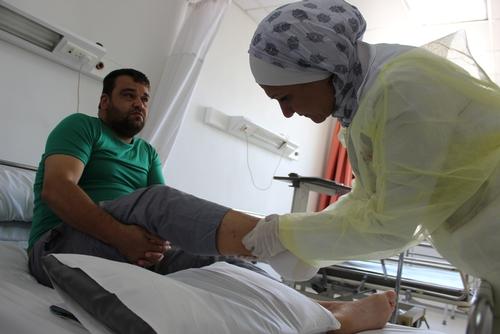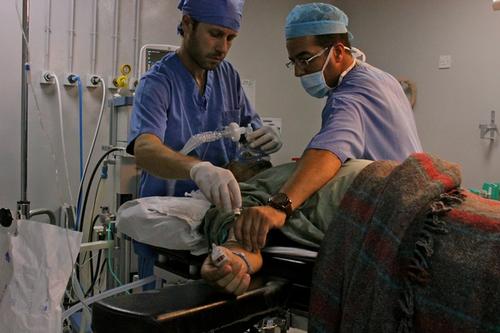Amman - Médecins Sans Frontières (MSF) has officially opened its newly upgraded reconstructive surgery hospital in Amman, Jordan. The hospital serves war wounded patients from across the region who have no access to specialized surgical care in their home countries. The project was established in 2006 in response to the absence of such care for victims of the war in Iraq and has since expanded to receive patients from Iraq, Gaza, Yemen, and Syria.
Nine years later, MSF decided to enhance the capacity of the project by moving into another hospital structure and renovating it, to better cope with the demand resulting from the continuing unrest in neighbouring countries. Through this move, MSF will be improving the quality of medical services provided to war victims, who usually arrive with a family member to assist their care and recovery if needed.
“In this new and expanded facility, our highly trained and specialized medical teams from the region are able to improve the quality of care provided to our patients. Our highest patient quota is currently from Syria, followed by Yemen and Iraq. The people of these countries have already witnessed and experienced so much suffering” said Marc Schakal, MSF’s Head of Mission in Amman, Jordan.
The hospital provides a comprehensive care package for its patients, which includes physiotherapy and psychosocial support alongside surgical interventions. Patients are also given accommodation, now available on site in the new location, and financial travel assistance to reach the hospital and return home after or in between treatments, if the care plan is staggered over time.
Since 2006, the hospital has admitted over 3,700 cases and conducted over 8,238 surgeries. Cases are identified by a network of Medical Liaison Officers in the patients’ countries of origin. Such numbers are just a drop in the ocean in the numbers of war victims suffering the consequences of regional turmoil.
“While they may receive initial care for their wounds, our patients do not usually have access to such specialized surgical procedures in their home countries, which are mostly at war. These hard to reach services include orthopaedic, maxillofacial and plastic reconstructive surgery, which we provide at no cost to the patients and lower running costs than the private sector,” said Dr Ashraf Al Bostanji, Head Surgeon.
The hospital has also conducted over 134,620 physiotherapy procedures and 45,660 psychosocial sessions since it was first established. Nahla Fadel from Iraq explains what a difference this support has made in her life.
‘’I arrived at the MSF hospital in 2013 for the first time and have undergone 24 surgeries. When I arrived, the mobility of my severely burned hands was so limited that I couldn’t comb the hair of my child or even feed him. Now, after two years of surgeries with MSF, my hand mobility is almost back to normal.”
Staffed by local and international experts, Dr. Ashraf explains what else makes this hospital stand out:
“The surgical techniques adopted in this project are world class. For instance, our team conducts microsurgeries, which involves three main types of surgeries: free flaps, nerve grafting and hand surgery. What makes this project stands out is implementing such a high level of technical expertise for war victims in the humanitarian medical field.”
MSF has been present in Jordan since 2006. In 2013 it set up a mother and child health care project in Irbid, which also offers mental health support, and an emergency trauma project in Ramtha close to the Syrian border.
MSF also runs clinics in Irbid for non-communicable diseases and a step down unit in Zaatari camp for Syrian refugees. For the past two years it has been sending medical donations including surgical kits to healthcare facilities in the South of Syria.
MSF is an international, independent, medical humanitarian organization that delivers emergency aid to people affected by armed conflict, epidemics, natural disasters and exclusion from healthcare. MSF offers assistance to people based on need, irrespective of race, religion, gender or political affiliation.





